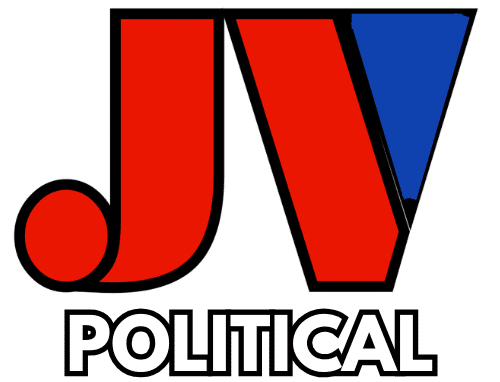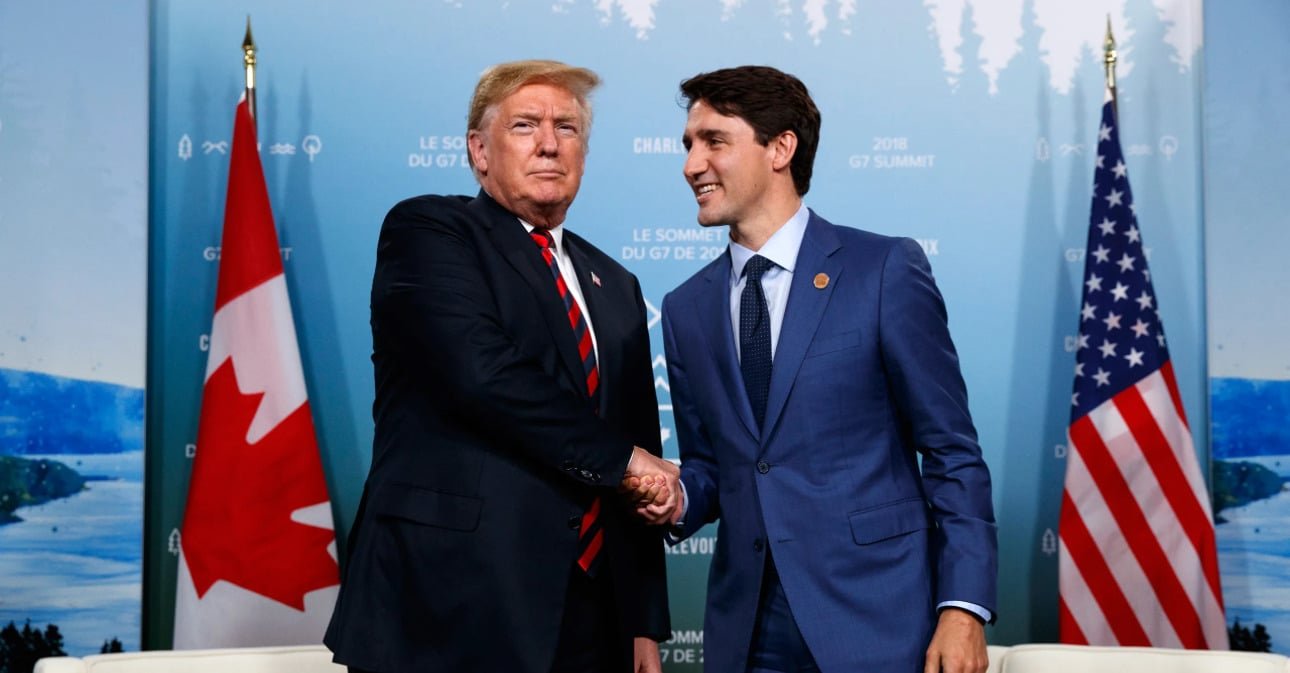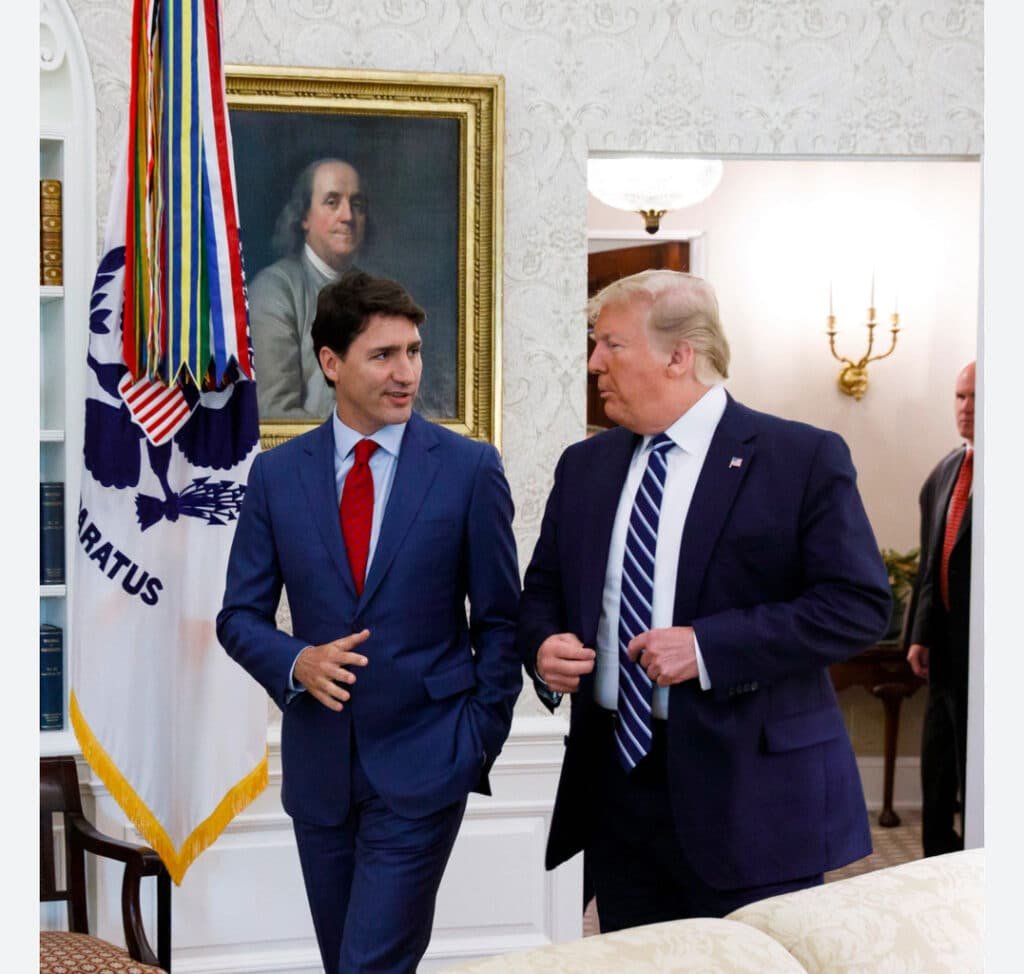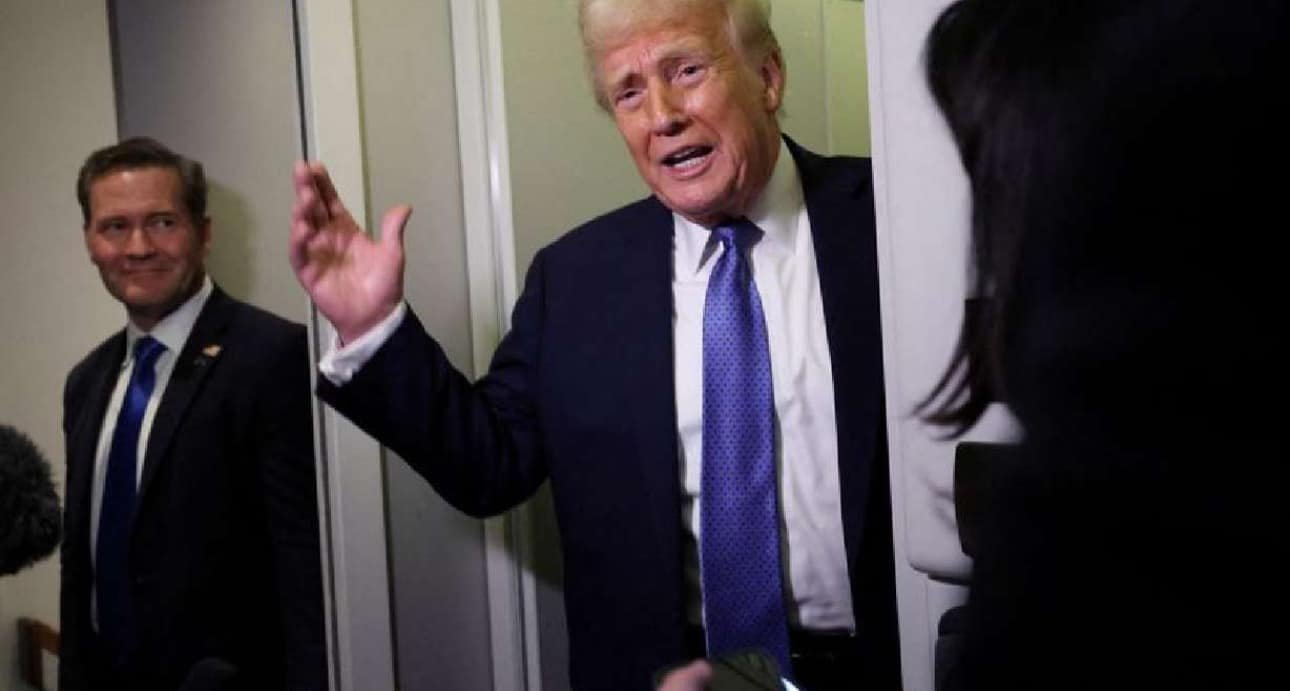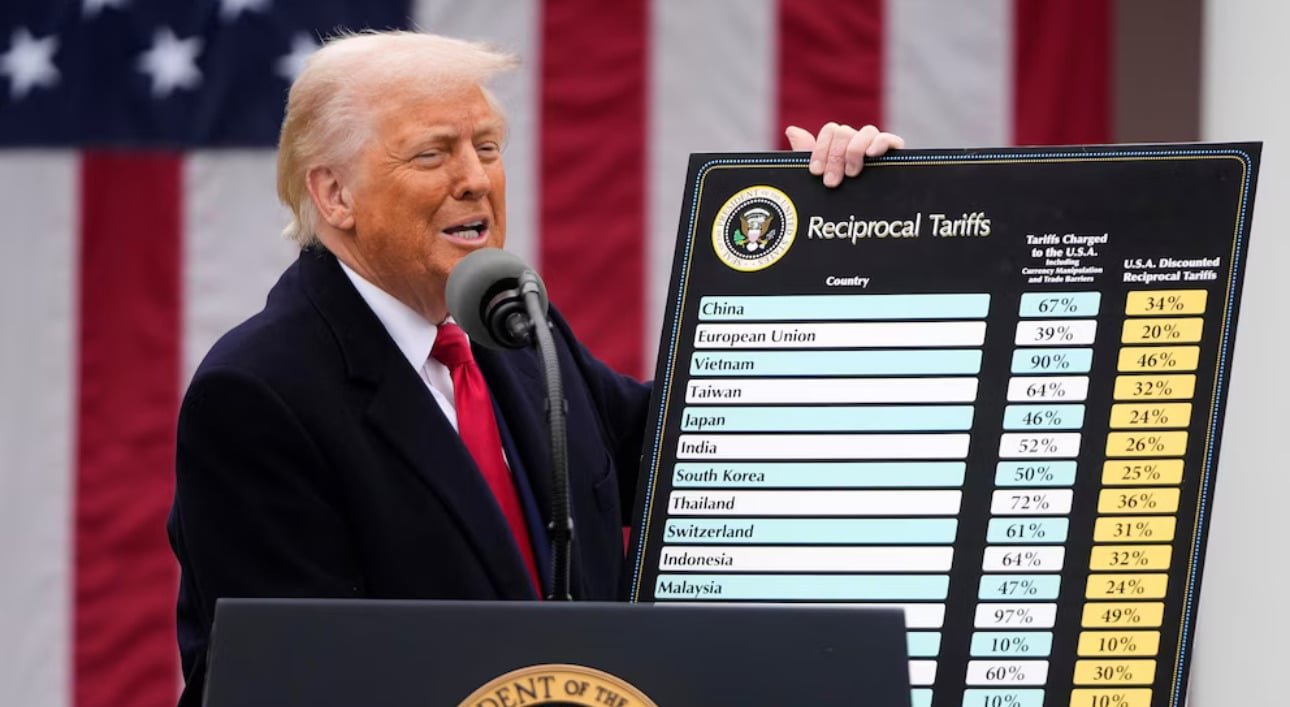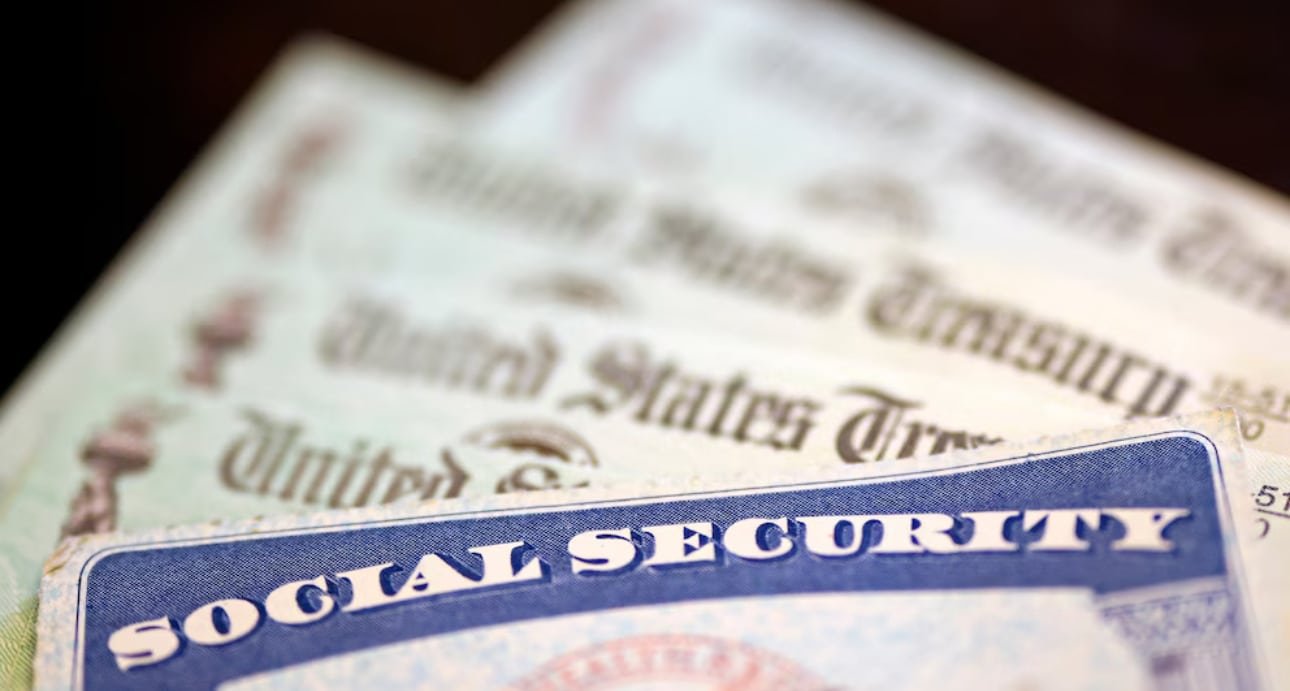Trump Says Trudeau’s Using ‘Tariff Problem’ for Reelection
President Donald Trump suggested Thursday that Canadian Prime Minister Justin Trudeau is leveraging the ongoing “tariff problem” between Canada and the U.S. to help secure his reelection.
“Believe it or not, despite the terrible job he’s done for Canada, I think Justin Trudeau is using the tariff problem, which he has largely caused, to run again for Prime Minister. So much fun to watch!” Trump posted on Truth Social.
Trump’s remarks come as Trudeau warned that Canada and the United States are likely to remain locked in a trade dispute for the foreseeable future.
Key Takeaways
- President Trump accuses PM Trudeau of using the current tariff problem for reelection purposes.
- Trump’s claims highlight the ongoing US-Canada trade dispute.
- The accusation is set against broader tariff issues affecting international relations.
- Trudeau’s alleged political strategy could impact the outcome of his electoral campaign.
- Trump’s statements have stirred significant public and political reaction.
Overview of the US-Canada Tariff War
The trade war between the United States and Canada has changed the way these two countries work together. It started when President Trump said Canada was not playing fair in trade. He wanted to protect American jobs. Now, both countries are feeling the effects of tariffs and trade disruptions.
Background and Context
President Trump put big tariffs on Canadian steel and aluminum, saying it was for national security. Canada then put tariffs on American goods worth $30 billion. This trade war has affected many areas, causing big changes in politics and trade.
Timeline of Events
The tariff fight has grown over time with important moments:
- January: The U.S. trade deficit hit a record high of $131.4 billion. Imports went up 10% to $401.2 billion, and exports rose slightly to $269.8 billion.
- April: Canada started to hit back with tariffs, affecting American businesses.
- Mid-Year: Business leaders worried about higher prices and labor costs because of tariffs.
- July: Canadian Prime Minister Justin Trudeau said he wouldn’t remove tariffs until the U.S. did. Commerce Secretary Howard Lutnick talked about a one-month break for certain goods.
- October: The impact was clear with over 50 mentions of tariffs in the Federal Reserve’s Beige Book. This showed companies were very concerned.
This timeline shows how complex and far-reaching the US-Canada tariff war is. It affects many industries, changing how markets work and international trade.
| Metrics | U.S. Figures | Canadian Response |
|---|---|---|
| Trade Deficit | $131.4 billion | N/A |
| Imports Increase | 10% | Counter-tariffs on U.S. goods |
| Retaliatory Tariffs | 25% on most goods, 10% on energy | $30 billion in counter-tariffs |
| Market Impact | Dow Jones dropped by 406 points | Canadian companies like Brown-Forman noted minimal impact |
| Industrial Impact | Concerns of price increases and labor costs | Active efforts to reduce reliance on U.S. exports |
| USMCA Exemptions | Temporary 30-day exemption for automakers | Over half of U.S. imports from Canada qualify |
Trump’s Recent Statements on Trudeau
President Trump has recently stepped up his criticism of Prime Minister Trudeau. He claims Trudeau is using the tariff dispute for political gain. Trump says Trudeau is using political tactics to sway public opinion in Canada.
Allegations of Political Strategy
Trump believes Trudeau is distracting from real issues by focusing on tariffs. He sees Trudeau’s actions as a last-ditch effort to hide his government’s failures. This adds to the already tense atmosphere over trade and diplomacy.
Trump’s Social Media Comments
Trump has also attacked Trudeau on social media, using platforms like Truth Social. He has questioned Trudeau’s leadership and trade policies. This shows how Trump uses social media influence to shape public opinion and political debates.
Trudeau’s Response to Trump’s Accusations
Prime Minister Justin Trudeau has spoken out against President Trump’s recent claims. He stressed Canada’s position on the ongoing tariff talks. Trudeau said Canada must act to protect its industries and jobs from U.S. tariffs.
The situation has made Canadian politics tense. The stakes are high for US-Canada trade relations.
Claims of Political Motivations
Trudeau defended his actions, saying they were for economic reasons, not politics. He explained that the tariffs were to protect Canada’s interests. Trudeau believes these steps are vital to fight back against unfair U.S. tariffs.
This move is seen as key to keeping Canada’s economy stable and fair.
Statements from Trudeau’s Office
Trudeau’s team explained why these actions were necessary. They emphasized the need for a strong but respectful talk with the U.S. to fix trade issues. They said the tariffs were a direct response to U.S. actions that harm Canada’s economy.
They also mentioned the International Monetary Fund’s warnings. The IMF said U.S. tariffs could badly hurt Canada’s economy because of its close ties with the U.S. market. This shows the economic side of Trudeau’s political stance.
Trudeau and his team are determined to handle the complex trade situation wisely. They aim to find a solution that protects Canada’s interests through diplomatic efforts.
Trump: Trudeau Using ‘Tariff Problem’ to Seek Reelection
The tariff issues have strained US-Canada trade and brought political fallout, mainly for Justin Trudeau. President Trump says Trudeau is using tariffs to help his reelection. This has sparked a big debate in Canadian politics.
Implications for Trudeau’s Political Future
Trump’s claims suggest Trudeau’s tough stance on tariffs is a political move. The 25% tariff on U.S. alcohol imports has upset companies like Brown-Forman. Canada only makes up 1% of Jack Daniel’s sales, adding to Trudeau’s political challenges.
This situation makes Trudeau’s political future uncertain. People are questioning his focus on trade over domestic issues.
Public Reaction in Canada
Canadian opinions are divided. Some see tariffs as a way to protect the economy. Others are skeptical.
For example, many Canadians are boycotting U.S. goods. This shows frustration with the economic back-and-forth. People are questioning Trudeau’s decisions and their impact on the economy.
Effect on Polls
Polls show a mixed view. Some support Trudeau’s stance on U.S. trade. Others see it as a distraction from important domestic issues.
The economic retaliation and ban on American liquor sales have caused both support and dissent. These changes in polls show Trudeau’s tariff handling is key to his reelection. Canadians are weighing the impact of his actions on the economy and society.
The Broader Impact on US-Canada Relations
The recent tariff war has put a strain on the US-Canada alliance. This alliance was built on mutual economic benefits and close ties. Now, it faces new challenges.
The Trump administration’s tariffs on Chinese imports and Canada and Mexico have caused big economic problems. Canada has hit back with 25% tariffs on $20.5 billion in U.S. goods. Mexico also has 25% tariffs on U.S. goods, adding to the tension.
| Country | Tariff Rate | Impact |
|---|---|---|
| China | 10-15% | Tariffs on agricultural products enhance geopolitical tension. |
| Mexico | 25% | Second largest US trading partner, escalating economic strain. |
| Canada | 25% | Tariffs on $20.5 billion of US goods, with further extensions planned. |
The financial markets have seen big drops, with the Dow Jones falling over 600 points. Analysts say big automakers could lose all their profits. The loss of U.S. alcohol sales in Ontario could be around $700 million a year.
Trade talks have hit a snag, with the USMCA Agreement facing hurdles. Both countries must find a way to protect their interests while keeping their relationship strong.
As tensions grow, finding common ground in trade is more important than ever. The US-Canada alliance is key for our economies and shared values worldwide.
Economic Ramifications of the Tariff Dispute
The tariff fight between the US and Canada has hurt both countries’ economies. Tariffs on goods have made business costs higher and more uncertain. What was once easy trade between the two nations now faces extra costs and careful planning.
Effect on Trade between the US and Canada
Trade between the US and Canada has changed a lot. In January, the US trade deficit hit a high of $131.4 billion. This was because imports went up by 10% to $401.2 billion. Exports only went up a bit to $269.8 billion.
This big trade gap shows how tariffs have messed up trade between the two countries.
Impact on Businesses
Businesses have had to adjust to the new tariff situation. For example, Walmart asked Chinese suppliers to lower prices because of tariffs. The ISM manufacturing survey showed worries about higher prices and labor costs.
Companies like Brown-Forman saw a 3% drop in sales because of tariffs and changes in how people shop. To stay stable, businesses have cut costs, like reducing staff.
Market Reactions
The stock market has been very shaky. The Dow Jones fell by 406 points. The S&P 500 and Nasdaq Composite dropped by 1.3% and 1.8%, respectively. This shows big worries about market stability.
The Federal Reserve’s Beige Book talked about tariffs affecting prices and costs in many sectors. This shows the big economic risks of the ongoing dispute and how it could hurt markets in the future.
FAQ
What accusations has President Trump made against Prime Minister Trudeau?
What was the catalyst for the current US-Canada trade dispute?
How has Trudeau responded to Trump’s accusations?
What has been Trump’s strategy in discussing the tariff issues on public platforms?
What are the economic impacts of the tariff dispute between the US and Canada?
What are the potentially long-term implications of the tariff war on US-Canada relations?
How has the Canadian public reacted to Trudeau’s handling of the tariff dispute?
How has the trade dispute impacted businesses in the US and Canada?
What are the broader geopolitical shifts indicated by the Trump-Trudeau tariff dispute?
What are key events in the timeline of the US-Canada tariff war?
Source Links
- Trump tariffs live updates: White House pauses tariffs on some Mexican imports until April 2
- Trudeau: US-Canada Trade War Will Continue for ‘Foreseeable Future’
- Trump announces partial tariff exemption for Mexico, citing border crackdown
- Trump delays tariffs on Mexican imports as Trudeau sees ongoing Canada-US trade war
- Trump’s Tariffs Set Off Day of Anger, Retaliation and Market Unease
- Trump tariff live updates: Trump pauses tariffs on some imports from Mexico after Lutnick hints at exemptions
- Jack Daniel’s Maker: Canada Pulling US Alcohol off Shelves ‘Worse Than Tariff’
- Trump says he’s lifting tariffs on most goods from Mexico for one month. Follow live updates. – The Boston Globe
- Trump tariff live updates: Trump pauses tariffs on some imports from Mexico after Lutnick hints at exemptions
